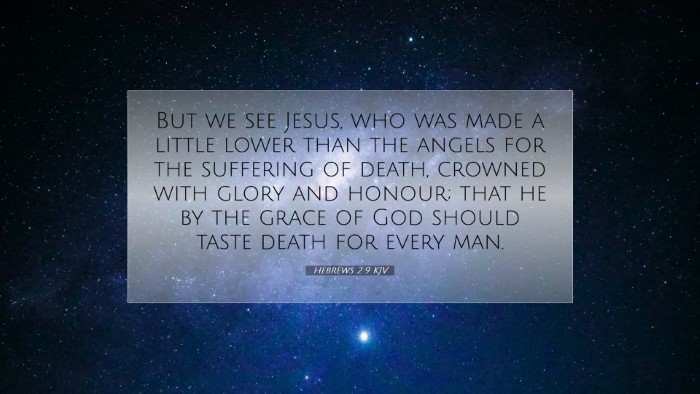Old Testament
Genesis Exodus Leviticus Numbers Deuteronomy Joshua Judges Ruth 1 Samuel 2 Samuel 1 Kings 2 Kings 1 Chronicles 2 Chronicles Ezra Nehemiah Esther Job Psalms Proverbs Ecclesiastes Song of Solomon Isaiah Jeremiah Lamentations Ezekiel Daniel Hosea Joel Amos Obadiah Jonah Micah Nahum Habakkuk Zephaniah Haggai Zechariah MalachiHebrews 2:9
Hebrews 2:9 KJV
But we see Jesus, who was made a little lower than the angels for the suffering of death, crowned with glory and honour; that he by the grace of God should taste death for every man.
Hebrews 2:9 Bible Commentary
Commentary on Hebrews 2:9
Hebrews 2:9 states, "But we see Jesus, who was made a little lower than the angels for the suffering of death, crowned with glory and honour; that he by the grace of God should taste death for every man."
Introduction
This verse presents a profound theological insight into the nature of Christ's incarnation and His redemptive mission. The author of Hebrews highlights the duality of Christ's experience—His temporary subordination to the angels and His ultimate exaltation—encapsulated within the framework of His sacrificial death.
Exegesis of the Text
-
Made a little lower than the angels:
The phrase highlights the humility of Christ. The commentary by Matthew Henry emphasizes that this temporary lowering was essential for Christ to fulfill His redemptive role. Though inherently divine and exalted, Christ took on human form, thus placing Himself lower than the heavenly beings to accomplish salvation for humanity.
-
For the suffering of death:
Albert Barnes explains that this refers to Christ’s incarnation and subsequent suffering. His humanity was necessary for Him to experience death, which was not only a part of His mission but also a means of redemption. The suffering He undertook was deliberate and serves as a model for believers regarding the significance of suffering in their own lives.
-
Crowned with glory and honour:
This aspect of the verse points to the exaltation of Christ post-resurrection. Adam Clarke remarks that while Christ was humbled in His earthly ministry, His resurrection and ascension conferred upon Him a glory that surpasses all human understanding. This notion reinforces the future hope and assurance for believers as they partake in the glory of Christ.
-
By the grace of God should taste death for every man:
This part of the verse underscores the universal aspect of Christ's atonement. Both Henry and Barnes affirm that Jesus' sacrificial death was not for an elect few but was intended for all humanity, representing the inclusive nature of the Gospel. The grace of God is highlighted as the driving force behind this redemptive act.
Theological Implications
The theological implications of Hebrews 2:9 are profound. It challenges believers to grasp the depth of God's grace and the love shown through Christ's willingness to suffer and die. This aligns with the broader messages found throughout Scriptures about God's plan for salvation and His intimate involvement in human history.
-
Christ's Humanity:
The emphasis on Christ being "made a little lower than the angels" illustrates His full humanity—a concept crucial for understanding the incarnation. The reality of Christ’s suffering and death connects with the existential realities faced by humanity, offering hope and identifying with our struggles.
-
The Nature of Redemption:
Redemption through suffering presents a paradox that reflects God’s wisdom. God’s way of saving humanity through the suffering of His Son challenges human reasoning and highlights the depth of divine love in the face of sin and death.
-
Encouragement for Believers:
The verse serves as an encouragement for believers facing trials. Clarke notes that understanding Christ’s suffering helps Christians to endure their own trials with hope, knowing that suffering is not the end but can lead to glory and honor.
Practical Applications
For pastors, students, and theologians, this verse compels introspection and application in various contexts:
-
Message of Hope:
In ministering to others, communicating the hope found in Christ's suffering and eventual glory can inspire and uplift. It encourages a broader understanding of suffering as a pathway to growth and redemption.
-
Community of Faith:
This verse invites the Christian community to support one another in times of suffering, reflecting Christ’s example of love. It encourages believers to be instruments of grace to each other, reminding them of God’s ultimate purpose.
-
Theological Reflection:
This passage provides a foundation for deeper theological discussions regarding the incarnation, atonement, and soteriology. It invites scholars to explore its implications in the context of contemporary issues related to suffering, grace, and community.
Conclusion
In summary, Hebrews 2:9 encapsulates the essence of Christ's mission—the divine humility, the necessity of suffering, the promise of glory, and the expansive grace offered to humanity. The insights garnered from public domain commentaries enrich our understanding, providing depth for preaching, teaching, and personal reflection. This verse continues to resonate deeply within the Christian faith, challenging and encouraging believers to fully embrace the implications of Christ’s work.


